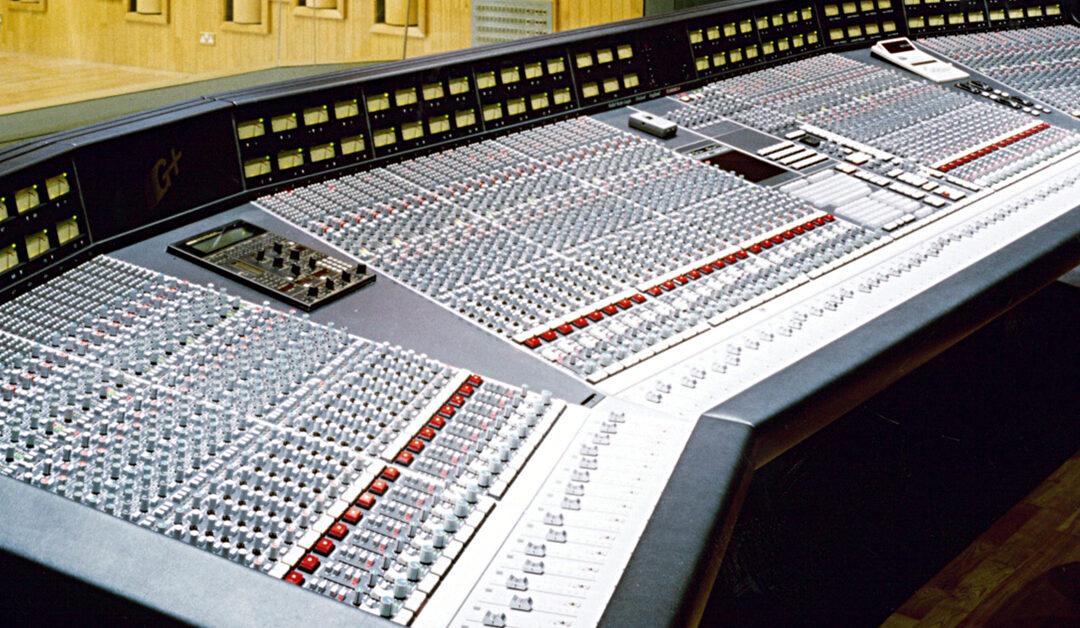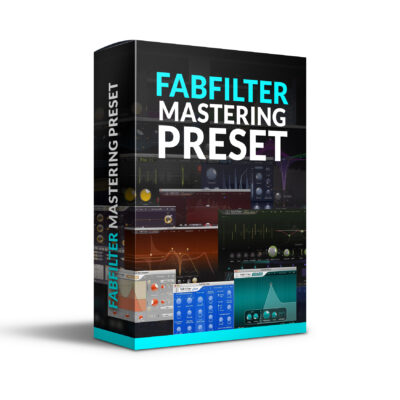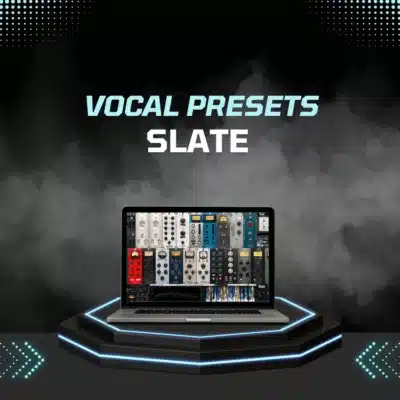DIY vs Professional Mixing: When to Do It Yourself (And When You Really Shouldn’t)
I got my start in mixing the old-fashioned way – as an intern at Waltz Audio in Boston, back when there were no YouTube tutorials or online mixing courses. If you wanted to learn how to mix records, you had to find your way into a real studio and hope someone would teach you.
The only reason I managed to keep my internship (and eventually get hired) was because I had something the older engineers didn’t: a Pro Tools Audio Media 3 card and the patience to figure out how to use it. This was the early days of digital recording, and while the seasoned guys could work magic on analog consoles, they were intimidated by the computer. I became their bridge to the digital world, and in exchange, they taught me everything about mixing.
Twenty years later, I’ve mixed over 2,000 tracks for everyone from bedroom producers to major label artists. I’ve seen the industry evolve from expensive analog studios to kids making hit records in their bedrooms. Having experienced both sides of the DIY vs professional mixing debate, I can tell you the answer isn’t what most people think.
Learning to Mix Before the Internet Era
Those early days at Waltz Audio were like a masterclass you couldn’t find anywhere else. I’d spend hours watching seasoned engineers work their magic on SSL consoles, ( and Yamaha consoles at Waltz) asking endless questions about why they reached for certain compressors or how they knew exactly which frequency to cut.
I was also studying Music Production and Engineering at Berklee College of Music at the time, which gave me the technical foundation – signal flow, acoustics, the theory behind compression and EQ. But honestly, school only taught me the basics. The real education happened during those studio sessions, watching problems get solved in real time.
There was no Google to answer “how do you make vocals sit in a dense mix” – you learned by watching someone do it and hoping they’d explain their thinking. Even now, twenty years later, I’m still learning little nuggets that change how I approach certain situations. That’s the thing about mixing that formal education can’t really prepare you for – it takes years of trial and error to develop the instincts that matter.
By the time affordable home recording became possible, I had this unique perspective. I understood both the professional studio approach and the limitations that bedroom producers were working within. That dual experience taught me something most mixing articles miss: the decision between DIY and professional mixing isn’t really about budget or gear. It’s about knowing what you’re trying to accomplish with each song.
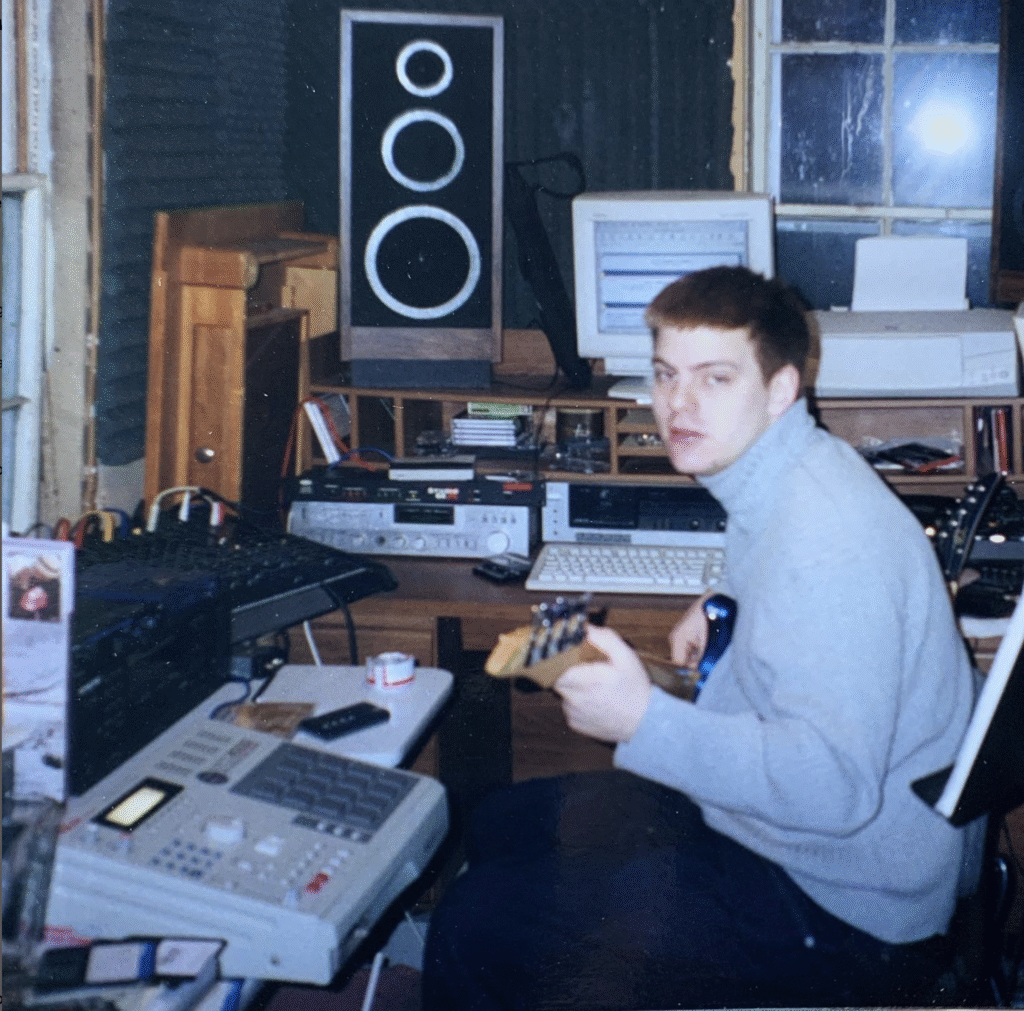
My first Home Studio. Before I owned a Professional Mixing Studio.
What DIY Mixing Really Means (Beyond Just “Doing It Yourself”)
When I say DIY mixing, I don’t mean mixing on laptop speakers with your neighbor’s dog barking in the background. Some of the best home mixers I know have setups worth more than my car. What makes it DIY is that you’re learning as you go, working in an untreated space, and wearing every hat from artist to engineer to quality control.
The tools have gotten incredibly powerful. Logic’s stock plugins are better than the $500 third-party ones I used to obsess over. YouTube tutorials can teach you techniques that used to require expensive courses. Hell, I still use some of the same stock compressors on major label projects that I discovered during those broke bedroom days.
But here’s what hasn’t changed: mixing is still really, really hard to learn. Not because the concepts are impossible, but because it takes thousands of hours to train your ears to hear what actually matters. I spent my first year fixing problems that weren’t problems and missing the ones that were killing my mixes.
Why Professional Mixing Can Be Worth Every Penny
The biggest difference between my bedroom setup and my current mix room isn’t the fancy gear – it’s that I can trust what I’m hearing. In my treated room with calibrated monitors, when I hear a problem at 80Hz, I know it’s actually there. Back in my apartment, I was basically guessing and hoping it would translate to other speakers.
But the real value of hiring a pro isn’t just the room or the gear. It’s pattern recognition. Last month, an artist sent me a track they’d been struggling with for weeks. The vocal just wouldn’t sit right no matter what they tried. Within ten minutes, I found a harsh resonance at 2.8kHz that was clashing with the guitar. After mixing thousands of vocals, these problems jump out at you.
There’s also the efficiency factor. What might take you 20 hours to mix, I can often finish in 4-6 hours. Not because I’m rushing, but because I’m not second-guessing every decision or going down rabbit holes that don’t serve the song.
And honestly? Sometimes you just need fresh ears. When you’ve been living with a track for weeks, you stop hearing it objectively. You don’t notice that the vocal’s slightly sharp in the second chorus, or that the low end is getting muddy. A good mixer hears it how your audience will hear it – clean and unbiased.
When DIY Mixing Actually Makes Sense
Despite what I do for a living, I don’t think everyone should hire a professional mixer for every track. There are plenty of situations where DIY mixing is not just acceptable, but actually the better choice.
If you’re genuinely interested in learning the craft, start mixing your own stuff. While I had the advantage of both Berklee training and professional studio experience, some of my favorite mixers are completely self-taught using today’s resources – YouTube tutorials, online courses, and forums that didn’t exist when I started.
But here’s what I learned that no school or tutorial can really convey: mixing is all about those little nuggets you pick up over years of trial and error. You might learn compression theory in a day, but understanding exactly when to use 2:1 ratio versus 4:1, or when to compress before or after EQ – that comes from making mistakes and hearing the differences hundreds of times. Even with my formal background, it took years to develop the instincts that let me work efficiently and make decisions that actually serve the song.
Budget is obviously a factor too. If you’re choosing between spending $500 on mixing or $500 on a music video, the video might be the better investment for your career right now. I tell budget-conscious artists to start with DIY mixing for demos and early releases, then gradually transition to professional mixing for their most important songs as their fanbase grows.
Some genres actually benefit from that DIY aesthetic. Think early Mac DeMarco, lo-fi hip-hop, or bedroom pop. In these cases, the rawness and intimacy of home mixing isn’t a limitation – it’s the whole point. Though even these “lo-fi” records usually benefit from professional mastering to make sure they translate across different speakers.
And if you’re one of those artists releasing a song every week, hiring a mixer for every track just isn’t practical. In hip-hop especially, I see artists who’ve gotten really good at mixing their own beats and vocals, then they’ll hire me for the singles they’re pushing to playlists.
The Moments When You Really Need a Professional
There are certain situations where trying to DIY your mixing can actually hurt your career. Playlist curators and music supervisors can tell within seconds if a track is sonically competitive. I’ve had multiple artists come to me after getting feedback like “love the song, but the mix needs work” from Spotify’s editorial team.
The difference is often subtle – a vocal that’s 1dB too loud, drums that lack punch, or a master that doesn’t have enough headroom. But these small issues can be deal-breakers when you’re competing for playlist spots or sync opportunities.
If you’ve been mixing your own tracks and you keep hitting the same wall – maybe the vocal never sits right, or your low end always sounds muddy – it’s probably time to bring in someone with fresh perspective. I worked with a producer last year who’d been mixing for five years. His beats were incredible, but something was always off with the final product. After one session, he told me he learned more watching me work for three hours than he had in months of YouTube tutorials.
And for major releases or career milestones, don’t leave anything to chance. Whether it’s your debut single, a track you’re pitching to labels, or something that could land you a sync deal – invest in making it sound as professional as possible.
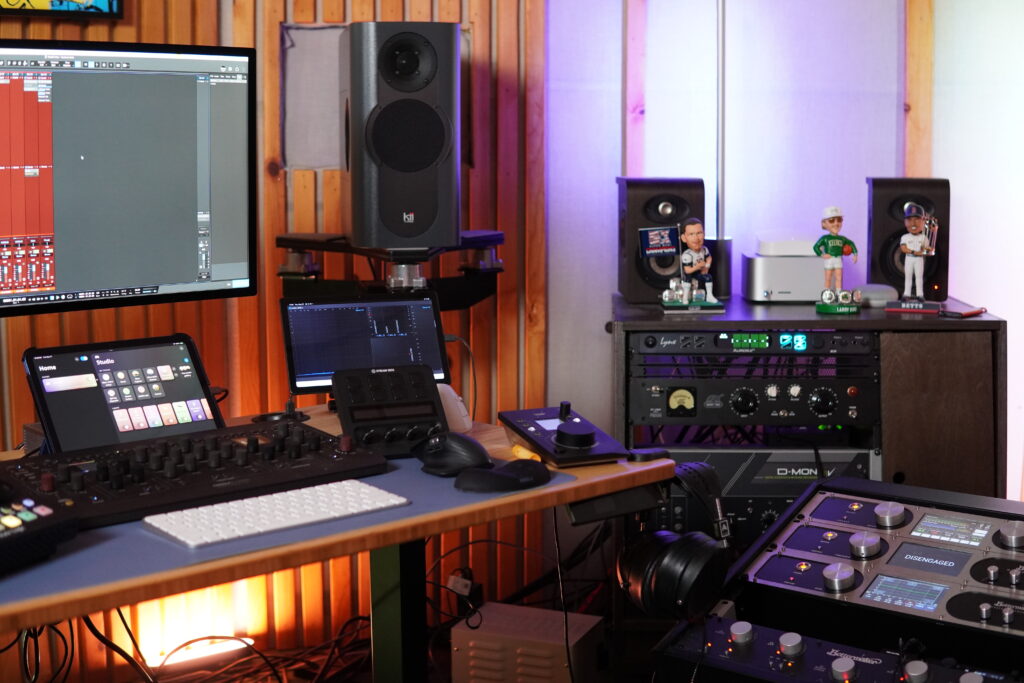
My Current Studio
What Most Successful Artists Actually Do
Here’s what I’ve observed working with artists at different career levels: most of them use a hybrid approach.
Emerging artists typically DIY mix their demos and early releases, then hire professionals for 1-2 key singles per year. They use the money they save to invest in better recording equipment and marketing.
Once artists hit that 10K-50K monthly listener range, they usually start professional mixing on all their official releases, but still DIY their loose tracks, freestyles, or experimental content. A lot of them work with the same mixer consistently to develop a signature sound.
Established artists with bigger budgets get everything mixed professionally, and often have different mixers for different moods – one person for their radio singles, someone else for their album cuts or more experimental stuff.
The pattern I see is that successful artists focus their energy on what they do best. If you’re naturally gifted at mixing and enjoy the process, keep doing it. But if you’d rather spend those 15 hours writing another song or building your fanbase, hiring a pro makes more sense.
The Real Cost Breakdown
Let’s talk numbers, because this decision often comes down to budget. If you’re going the DIY route seriously, you’re looking at $1,000-3,000 in initial setup costs for a decent DAW, monitors, audio interface, and some basic room treatment. Plus hundreds of hours learning and practicing.
Professional mixing typically runs anywhere from $200-800 per song, depending on the engineer’s experience and your genre. For a 10-song project, you’re looking at $2,000-8,000.
The break-even point is usually around 15-20 songs if you’re planning to release consistently. But that’s just the financial math – you also have to factor in your time and opportunity cost.
How to Know If Your DIY Mix Is Actually Ready
The biggest challenge with DIY mixing is knowing when you’re done. Here’s my translation test that every mix needs to pass:
Play it on studio monitors – does it sound balanced? Switch to headphones – can you hear all the details? Test it in your car – does the bass translate and can you still hear the vocal clearly? Finally, play it on laptop speakers or phone speakers – does the mix still make sense when everything’s cramped together?
I also recommend the reference check. A/B your mix against commercial songs in your genre, making sure to level-match them first. Does your track have similar energy in the low end, mids, and highs? Are the dynamics comparable?
Most importantly, take breaks and get objective feedback. Your ears get fatigued, and you become emotionally attached to your own work. Sometimes the best thing you can do is step away for a few days, then come back with fresh perspective.
Common Mistakes I Used to Make (And Still See All the Time)
Looking back at my early mixes, I was making every classic mistake in the book. I over-compressed everything because I thought that’s what “professional” meant. I mixed way too loud because it felt more exciting. I’d spend hours tweaking tiny EQ adjustments instead of stepping back to hear the big picture.
The biggest mistake though was trying to fix arrangement problems with mixing. If your bass and kick drum are fighting for space, sometimes the answer isn’t EQ – it’s changing the bass part. You can’t mix your way out of fundamental arrangement issues.
I also used to ignore the arrangement context. I’d get so focused on making each element sound perfect in isolation that I’d lose sight of how everything worked together as a song.
Finding the Right Professional Mixer
If you do decide to hire someone, don’t just go with whoever has the biggest name or the most expensive rate. Look for mixers who’ve worked on songs similar to your vision. A great pop mixer might not understand the aesthetic you’re going for if you’re making experimental hip-hop.
Good mixers will ask you questions about your goals, references, and vision before they start working. They want to understand what you’re trying to accomplish, not just apply their default approach to your tracks.
Make sure you understand their revision policy and timeline upfront. Most professional mixers will deliver within 3-10 days and include 2-3 rounds of revisions in their fee.
My Honest Recommendation
After twenty years doing this professionally, here’s what I tell artists: if you’re genuinely interested in mixing and have the time to learn properly, start with DIY. Even if you eventually hire professionals, understanding the process will make you a better artist and collaborator.
But be strategic about when you invest in professional mixing. For demos and early releases, DIY is usually fine. For playlist submissions, sync opportunities, or major releases, the investment in professional mixing often pays for itself.
Most importantly, don’t let perfect be the enemy of good. I’d rather hear a finished song with a decent DIY mix than an unfinished masterpiece that never gets released because you’re stuck tweaking the kick drum.
The music industry has room for both approaches. Some of the biggest hits of the last few years were mixed in bedrooms. Others required teams of professionals and six-figure budgets. What matters is matching your approach to your goals and being honest about what each song needs to succeed.
Whether you choose DIY or professional mixing, remember that the goal is always the same: serve the song and connect with listeners. Everything else is just tools and technique.
If you are interested in my professional mixing and mastering services feel free to email or call to talk about your project. I also offer free unlimited revisions for first time clients.

